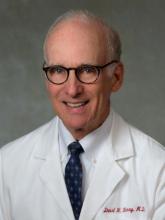David Fajgenbaum, MD, of the University of Pennsylvania, Philadelphia, is a pioneer in the research of Castleman disease and he’s a patient himself. He joins Blood & Cancer host David Henry, MD, of Pennsylvania Hospital, Philadelphia, to talk about the presentation of Castleman, available treatments, and his own patient journey.
Plus, in Clinical Correlation, Ilana Yurkiewicz, MD, of Stanford (Calif.) University, talks about compassion fatigue among friends and family of cancer patients.
Show notes
Castleman disease is a group of disorders unified by certain histologic features, including:
- Atrophic (B-cell depleted) germinal centers with wide mantle zones.
- Increased number of plasma cells in the interfollicular space.
- Increased number of blood vessels in the interfollicular space.
The disease can be subdivided into unicentric Castleman disease (UCD) or multicentric Castleman disease (MCD), based upon the extent of the lymph node involvement.
- Multicentric Castleman is further subdivided into HHV8-associated and non HHV8-associated (idiopathic) disease.
- Determination of HHV-8 status is very important for the selection of the appropriate therapeutic strategy.
The presentation of Castleman Disease may be similar to the presentation of lymphomas, including fatigue, night sweats, peripheral edema, pancytopenia, and disseminated lymphadenopathy.
- The diagnosis depends on the unique histologic appearance after bone marrow biopsy is performed.
- Patients with Castleman disease often require hospitalization given rapid progression of symptoms due to massive cytokine release.
MCD is a rare clinical entity, and to date, only one randomized controlled trial has been published to date (involving siltuximab).
Therapeutic options:
- Unicentric Castleman disease
- Effectively treated with surgical excision of enlarged lymph node.
- Multicentric Castleman disease
- Rituximab (anti-CD20 monoclonal antibody)
- Has been used off-label as first-line treatment in HIV-positive/HHV-8-positive MCD, alone or in combination with conventional chemotherapeutics.
- Siltuximab (anti-IL-6 monoclonal antibody)
- Currently the only approved treatment of idiopathic MCD in the United States.
- Tocilizumab (humanized IL-6 receptor antagonist)
- Approved for treatment of idiopathic MCD in Japan.
- Sirolimus (mTOR pathway inhibition)
- Under investigation at the University of Pennsylvania for treatment of patients who have been refractory to IL-6 blockade.
- Bortezomib (selective proteasome inhibitor) and Anakinra (IL-1 receptor antagonist)
- A small number of case reports suggest these may be used in MCD.
- Rituximab (anti-CD20 monoclonal antibody)
Dr. Fajgenbaum can be reached at davidfa@pennmedicine.upenn.edu. More information about Castleman disease can be found at www.cdcn.org.
Dr. Fajgenbaum’s memoir is Chasing My Cure: A Doctor’s Race to Turn Hope into Action
Show notes by Sugandha Landy, MD, resident in the department of internal medicine, University of Pennsylvania, Philadelphia.
For more MDedge Podcasts, go to mdedge.com/podcasts
Email the show: podcasts@mdedge.com
Interact with us on Twitter: @MDedgehemonc
Ilana Yurkiewicz on Twitter: @ilanayurkiewicz

